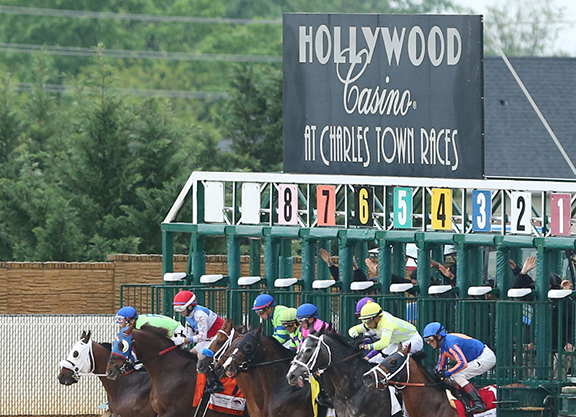By T. D. Thornton
The future of the $1.2 million signature stakes event at Charles Town Races hangs in the balance after the West Virginia Racing Commission (WVRC) tabled the approval of the track's entire 2018 open stakes schedule at its Dec. 11 monthly meeting.
Debate over okaying the stakes schedule–which in many states is a perfunctory action performed at the commission level–centered on objections raised by commissioner Ken Lowe Jr., who argued that he cannot justify approving a seven-figure purse for just a single race, the GII Charles Town Classic. The Charleston Gazette-Mail first reported the dispute.
Charles Town officials countered that the Classic has become the calling card for the track since the nine-furlong race for older horses was established in 2009, and that the expenditure from the purse account is well within the parameters of the negotiated horsemen's contract. The prominent April race, they argued, pays dividends in terms of boosted handle and serves as a marketing tool that gets the track noticed on a national level.
Although Lowe is a first-year commissioner on the three-person board, he is a long-time West Virginia horse owner, and Tuesday's standoff is not the first he has had with Charles Town management.
In 2011, when Lowe was president of the Charles Town Horsemen's Benevolent and Protective Association, track management ejected him from the property for a violation of Charles Town's house rule against solicitation (authorizing the distribution of political flyers).
When reached by phone Wednesday at his real estate development business in Shepherdstown, about 12 miles north of the track, Lowe emphatically denied that a grudge or retaliation played any part in his reasoning for not voting in favor of the stakes schedule.
“No. Not in the slightest. I'm 69 years old. I don't hold grudges. But I do look at the big picture, and I try to understand both sides,” Lowe said. He added that his getting barred from Charles Town was a “bogus deal” and that a lawsuit he initiated against Charles Town over the matter resulted in an out-of-court settlement that he cannot discuss.
Erich Zimny, Charles Town's vice president of racing operations, told TDN he did not wish to comment on Lowe's previous relations with the track. Zimny instead preferred to focus on the merits of the Classic itself.
“For a long, long time, Charles Town was in no way integrated with the national racing scene,” Zimny said. “Before, there was no day when eyeballs around the nation were going to be on our product. The Classic provides the type of attention that traditional advertising could never buy us. The nine largest handles in Charles Town history are all Charles Town Classic days.”
Beyond the boosted handle on that one big day of racing, Zimny pointed out that the Classic creates a “halo effect” that buoys business during the rest of the year.
“Since we've started this race in 2009, our [daily] handle per race is up 65%,” Zimny said. “And purses paid to West Virginia-breds have basically doubled from when the Classic started in '09 to today. Is it all because of that one race? No. But the Classic is the anchor of our calendar, and it is the one thing that we saw that this program needed to move forward.”
Lowe didn't buy that logic when it was presented at the meeting.
“I said that I would not support a $1.2 million purse for the race. I would consider a $300,000 purse,” Lowe explained. “I can't, in good conscience, justify spending that much for one race. There's no local horses involved. To my knowledge, there's no local jockeys involved. It's giving money away to [owners from other jurisdictions] when Charles Town [horsemen are] struggling. I would think there would be more benefit to having ten $100,000 races. Or even four $250,000 races. Market it right.”
Zimny said he is skeptical Charles Town would get much bang for its buck that way.
“At a $300,000 purse, I just don't know that we would be able to get the horses that we want to get for a race like that,” Zimny said. “It would probably be a bad business decision to run the race for $300,000.”
Zimny added that while he can't speak on behalf of the horsemen, he noted none of them showed up at Tuesday's meeting to voice objections to the stakes schedule, which includes five other open stakes.
“The Classic has already taken a 20% purse cut from where it was at its highest point,” Zimny said. “It was $1.5 million for a few years. We've been giving away the same percentage of unrestricted stakes purses for several years now, and it's always gotten passed [by the commission].”
Zimny explained that Charles Town's contract with horsemen allows for the budgeting of 8% of the purses paid for the prior year to go toward the following year's non-state-bred stakes schedule. He noted that at other tracks, that amount can be as high as 20% to 30%.
“Our number in our contract with our horsemen is one of the lowest in the country,” Zimny said.
Lowe said it is up to the board's chairman to decide when and if the item will be placed on the January agenda for reconsideration. A message left Wednesday with the WVRC executive director seeking clarification on whether the issue will come up again was not returned before Thursday's deadline for this story.
“We can't find an instance where a commission has rejected a stakes schedule. It may exist somewhere, but we certainly haven't been able to find it,” Zimny said.
Not a subscriber? Click here to sign up for the daily PDF or alerts.






